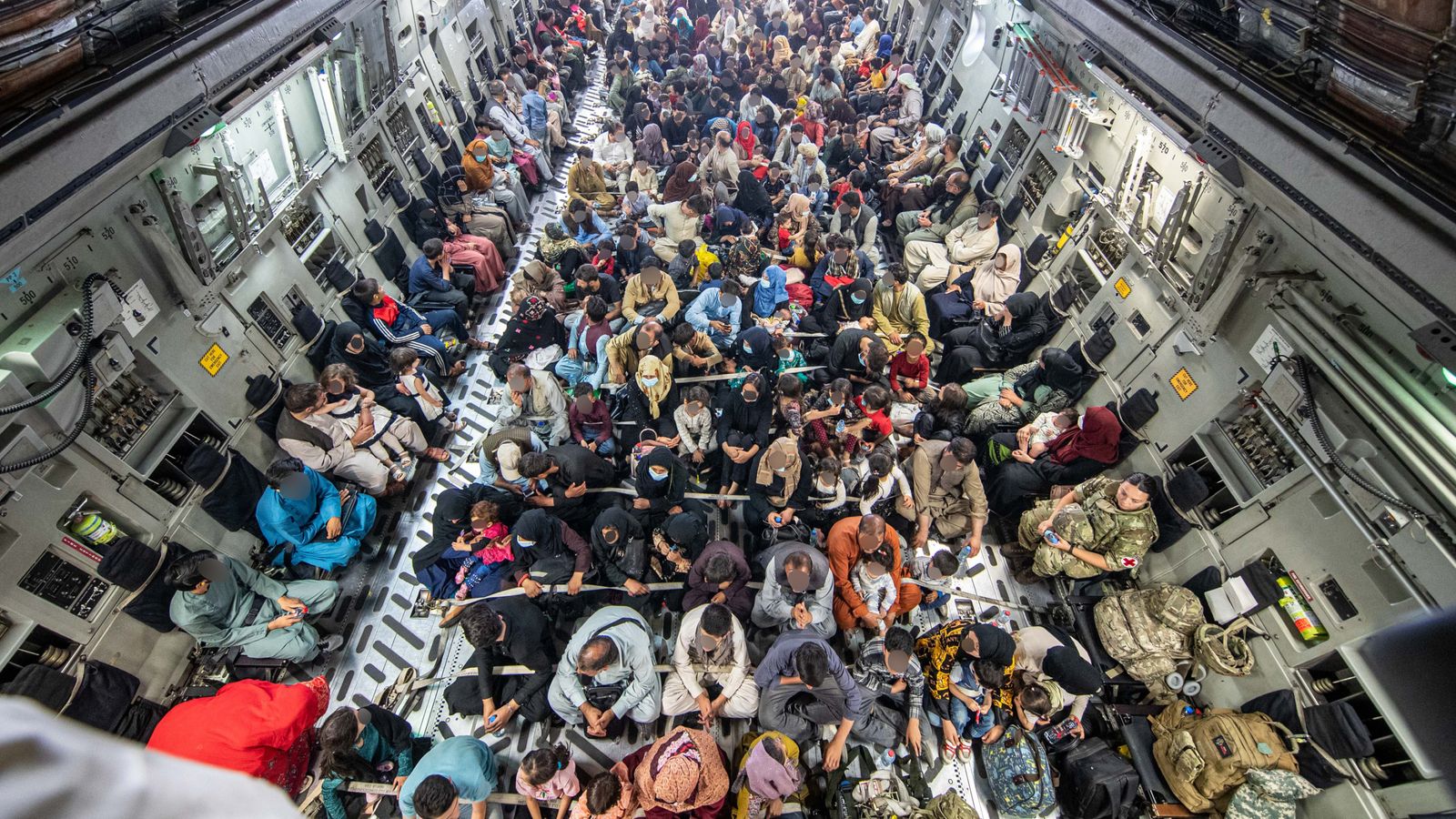A senior Foreign Office whistleblower has accused the department’s top civil servant of misleading MPs over the Afghanistan evacuation.
Josie Stewart, head of illicit finance at the Foreign Office (FCDO), described as “inaccurate” claims made by Sir Philip Barton, permanent under-secretary at the Foreign Office, that he did not know Boris Johnson called for staff at animal charity Nowzad to be evacuated despite others being more of a Taliban target.
She said she will most likely lose the job she loves for calling out the FCDO’s response but said she feels a “strong sense of moral injury for having been part of something so badly managed”.
Ms Stewart, who has been with the FCDO since 2015, including at the embassy in Kabul, gave written evidence to the foreign affairs select committee.
Read more:
Eight key accusations made by Afghanistan whistleblower in 2021
Testimony supports previous whistleblower
She said she has come forward to corroborate junior FCDO official Raphael Marshall’s account, which he gave last year, and although she said she does not agree with all of it, she agrees with “the majority of the substance and all of the essence”. She said she had never heard of him before his account.
Nazanin Zaghari-Ratcliffe: British-Iranian national criticises UK government for six-year delay in getting her freed from Iran jail
Morad Tahbaz: British-US national detained in Iran goes on hunger strike as family reveal they feel ‘abandoned’
Ukraine war: Russia responsible for hoax calls to cabinet ministers last week, Downing Street confirms
The senior official’s evidence has been released ahead of MPs on the committee questioning Sir Philip and Nigel Casey, director of the Foreign Office’s Afghanistan, Pakistan and Iran directorate, this afternoon.
Among the catalogue of criticisms she has for the department over the evacuation, she said the two men knew Mr Johnson called for staff at Nowzad to be evacuated, despite others being more at risk from the Taliban due to their work for the British government.
There was no prioritisation over which vulnerable Afghans should be evacuated and she has seen “no evidence” of Sir Philip taking Mr Marshall’s testimony seriously after claiming he did, she added.
Political correspondent
This is the second foreign office official to turn whistleblower to criticise the government’s handling of the Afghanistan evacuation last summer, and her testimony is even more explosive.
Josie Stewart is a senior official – she worked at the British embassy in Kabul and has experience of previous crises. Her central allegations are that the way the operation was handled was not only a “moral injury” but involved ministers and senior officials misleading parliament.
Her testimony questions the accounts provided by Number 10, the former foreign secretary Dominic Raab and the most senior civil servant at the foreign office Sir Philip Barton – whom she accuses of lying.
Ms Stewart backs up a claim made last December by junior official Raphael Marshall. In an account backed up by emails, he told the foreign affairs select committee that the prime minister personally approved the evacuation of 67 staff from the Nowzad animal charity – against official advice and criteria.
But even more incendiary are her claims that thousands of emails from desperate Afghans piling up in foreign office inboxes were never even read.
Securing safe passage to the UK was based on “who happened to open or forward which random email”, she wrote. When this was exposed in newspaper reporting, she says the priority was managing “political fallout”.
Still employed as head of illicit finance at the Foreign Office, Ms Stewart acknowledges speaking out will likely mean she loses her job. But she says she feels obliged to do so because civil servants have to speak out if they think the government is misleading the public or parliament.
Ministers have trumpeted the evacuation of 15,000 people from Afghanistan in just two weeks and in incredibly difficult conditions, more than any other country except the US.
This account again calls into question the foreign office’s priorities and competence. Sir Philip will appear before the committee later today for what will no doubt be an uncomfortable session. Others, including the prime minister, will face questions about it.
She also said the only urgency she ever saw into managing the reams of emails coming in from Afghans fearing for their lives and MPs trying to get them out, was so Dominic Raab, the foreign secretary at the time, could say all MPs’ emails had been read and to send a generic response to them.
Ms Stewart also said the FCDO was risk-averse so did not do everything it could to get Afghans out over concerns of the “UK looking bad if something happened”.
The government was accused of putting animals before people when the Nowzad charity was allowed to evacuate its animals while many eligible Afghans were left behind.
But Ms Stewart said: “I am not aware of any deliberate decision to prioritise animals over people, and do not believe that this happened intentionally.”
PM’s involvement in evacuation decisions
She did say it was “widespread knowledge” in the FCDO’s crisis centre – and she saw “numerous emails” – that the decision to allow Nowzad’s Afghan staff to be evacuated was taken after the PM said they should be – despite officials saying they were not eligible and others were more at risk from the Taliban.
Sir Philip told the committee in December last year he was “not aware of the decision-making” about the evacuation of Nowzad staff.
In January he then said he had no reason to believe the decision was made because of the prime minister, and Mr Casey had not received emails about it.
But then an email, with Mr Casey copied in, revealed emails saying just that had been sent and Sir Philip apologised for “inadvertently inaccurate answers” and said Mr Casey had been busy and did not remember the email.
Please use Chrome browser for a more accessible video player
Ms Stewart said letters from Sir Philip and Lord Ahmed of Wimbledon claiming Nowzad staff were included “by officials in the potential cohorts to be considered for evacuation if space became available” were “misleading”.
She said they were actually included as a “late addition only in response to this PM decision… against the previous judgement of officials”.
“I do not find it credible that Philip Barton, or those who drafted his letter dated 17 January 2022, would not have been aware of this,” Ms Stewart said.
‘No urgency in answering emails from Afghans and MPs’
She also said Mr Raab’s claim in September, two weeks after the evacuation, that the FCDO had been “urgently working through correspondence” from eligible Afghans and MPs was “not accurate”.
Please use Chrome browser for a more accessible video player
“The only urgency I ever saw injected into managing correspondence was when the previous foreign secretary undertook that FCDO would reply by Monday 6 September to all MPs who wrote in about Afghanistan cases before 31 August,” she said.
“This was purely in order to enable the foreign secretary to say that all emails from MPs had been read, and to issue a generic response.
“I do not believe that anything was actually done with any of the information in these emails at that time. The only urgent requirement was to manage the political fallout and to appear to MPs as if something was being done – not to actually manage, understand and act on correspondence.”
‘No prioritising happened’
Ms Stewart also said the criteria for prioritising special cases was “largely meaningless” and prioritisation was based “on who happened to open or forward which random email, and who could most quickly transcribe data from emails into spreadsheets”.
She said Sir Philip’s claim to the committee they used FCDO and MoD knowledge of Afghanistan and evidence of targeting by the Taliban “is, in my opinion, a description of idealised fantasy. I did not see this happen once.”
The FCDO told Sky News: “At all times officials have responded to the committee’s questions in good faith, on the basis of the evidence available to us at the time.”
“The prime minister has made clear he had no role in authorising individual evacuations from Afghanistan during Operation Pitting, including Nowzad staff and animals.
“As is the case after all crises, the FCDO is committed to learning lessons and using its experience to improve the way the organisation responds to crisis overseas. We have incorporated many of the lessons into our response to Russia’s invasion of Ukraine.”






















